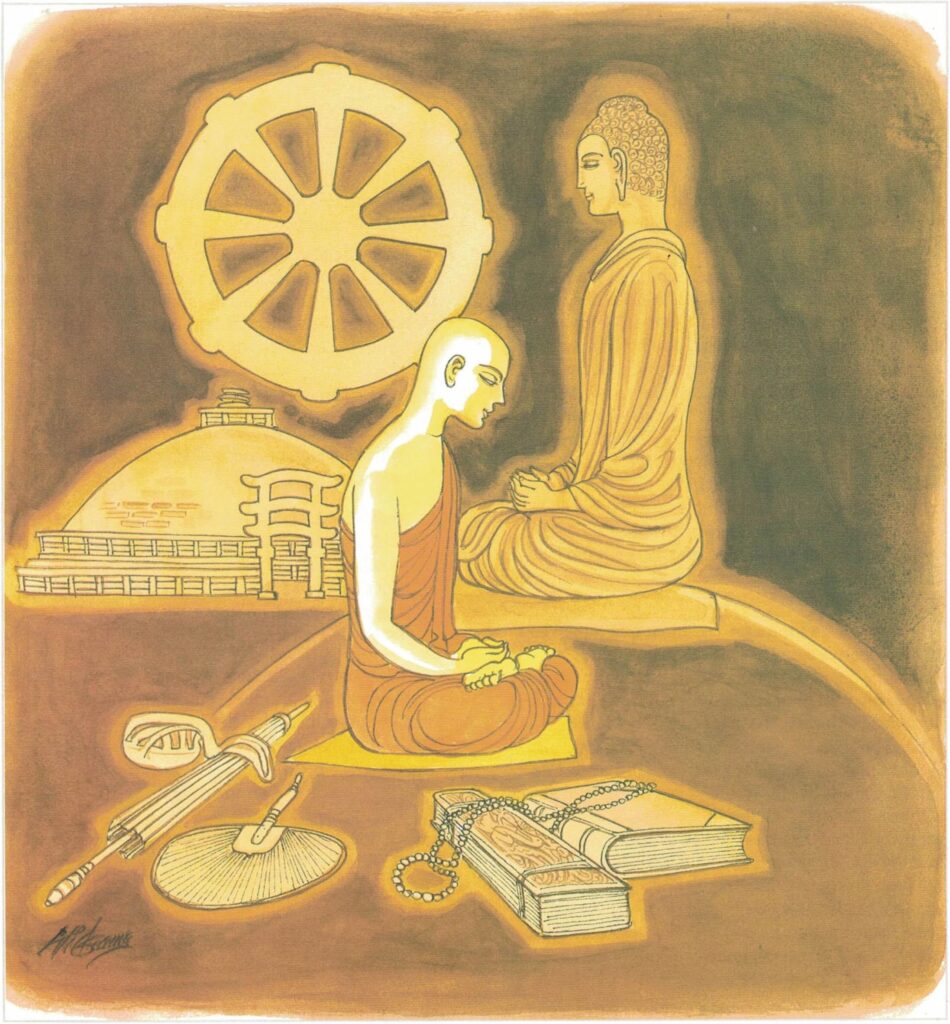Pali text, illustration and English translation of Dhammapada verse 364:
dhammārāmo dhammarato dhammaṃ anuvicintayaṃ |
dhammaṃ anussaraṃ bhikkhu saddhammā na parihāyati || 364 ||
364. The bhikkhu who in Dhamma dwells, in Dhamma delighting and pondering, remembering the Dhamma—he does not decline from Dhamma True.

The Story of Venerable Dhammārāma
While residing at the Jetavana Monastery, the Buddha spoke this verse with reference to Venerable Dhammārāma.
When it was made known to the disciples the Buddha would realize parinibbāna in four months, most of the puthujjana monks (i.e., those who had not attained any of the maggas) felt extremely depressed and were at a loss and did not know what to do. They just stayed close to the Buddha, hardly ever leaving his presence. However, there was a monk by the name of Dhammārāma who kept to himself and did not go near the Buddha. His intention was to strive most ardently to attain arahatship before the passing away of the Buddha. So he strove hard in insight meditation practice. Other monks, not understanding his attitude and his noble ambition, misunderstood his behaviour.
Those monks took Dhammārāma to the Buddha and said to the Enlightened One, “Venerable! This monk does not seem to have any affection or regard or reverence for you; he has been staying by himself while all the time other monks are staying close to your presence.” When other monks had said everything they wanted to say, Dhammārāma respectfully explained to the Buddha why he had not come to see the Buddha and also reported that he had been striving his utmost in insight meditation practice.
The Buddha was satisfied and was very pleased with the explanation and conduct of Dhammārāma and he said, “My son, Dhammārāma, you have done very well. A monk who loves and respects me should act like you. Those who made offerings of flowers, scents and incense to me are not really paying me homage. Only those who practice the Dhamma truly pay homage to me.”
Explanatory Translation (Verse 364)
dhammārāmo dhammarato dhammaṃ anuvicintayaṃ
dhammaṃ anussaraṃ bhikkhu saddhammā na parihāyati
dhammārāmo [dhammārāma]: he has the Teaching as his abode; dhammarato [dhammarata]: attached to dhamma; dhammaṃ anuvicintayaṃ [anuvicintaya]: he reflects upon the dhamma repeatedly; dhammaṃ anussaraṃ [anussara]: memorising and remembering the dhamma; bhikkhu: the monk; saddhammā: from the noble Teaching; na parihāyati: does not go astray
The monk who abides in the Dhamma, who delights in the Dhamma, who meditates on the Dhamma, and is ever mindful of the Dhamma, does not fall away from the Dhamma of the virtuous.
Commentary and exegetical material (Verse 364)
Virtues of the Dhamma: This verse was spoken by the Buddha in praise of a monk who dwelt with utter concentration on the virtues of the Dhamma.
Six outstanding virtues of the Dhamma are enumerated:
(1) Svākkhāto Bhagavatā Dhammo: The Dhamma has been well-expounded by the Buddha. It is excellent in the beginning, excellent in the middle and excellent at the end. The Dhamma always possesses just one flavour–that of Nibbāna;
(2) Sandiṭṭhiko: This implies that the beneficial results of the Dhamma will be manifested here and now;
(3) Akāliko: The Dhamma is timeless. Since Dhamma is reality, it never withers with time;
(4) Ehipassiko: Dhamma is open to anyone to come and see–ehipassiko literally means come and see;
(5) opanayiko: This means that all those who adhere to the Dhamma will tread along the path leading to eternal peace and happiness;
(6) Veditabbo Viññuhi: This implies that Dhamma has to be comprehended by each wise individual for himself.